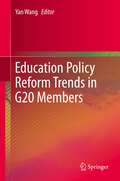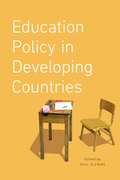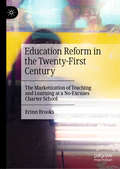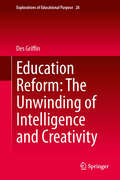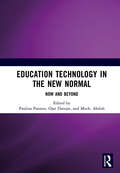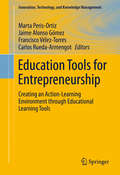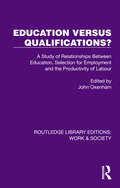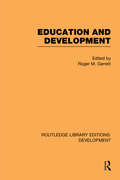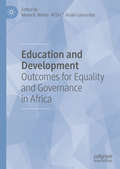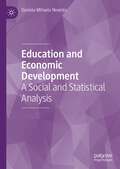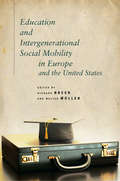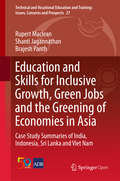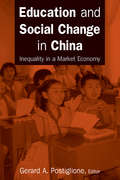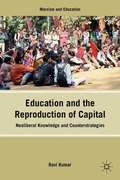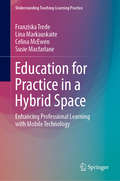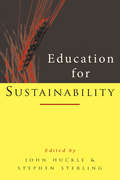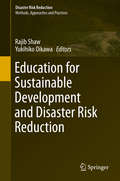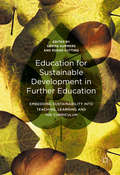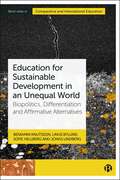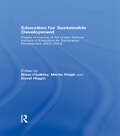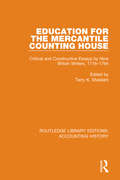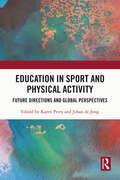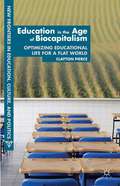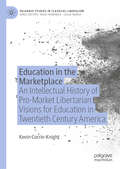- Table View
- List View
Education Policy Reform Trends in G20 Members
by Yan WangG20 members bring together the world's major advanced and emerging economies, as well as the European Union. Together they represent some 90% of global GDP, 80% of global trade and two-thirds of the world's population. In recognition of educational development as a key driver of economic development, the G20 members have put education reform high on their policy agenda in order to meet the challenges and embrace the opportunities ahead. Their experiences and lessons in education reform will not only showcase the global trend of education development, but also will provide valuable reference and inspiration for undertaking education reform to advance national development in China as well as other countries. This book documents recent policy reform in G20 members' systems, showcases the global trends in education policy, serves as a valuable reference tool and also provide inspiration for undertaking education reform to advance development in related countries.
Education Policy in Developing Countries
by Paul GlewweAlmost any economist will agree that education plays a key role in determining a country’s economic growth and standard of living, but what we know about education policy in developing countries is remarkably incomplete and scattered over decades and across publications. Education Policy in Developing Countries rights this wrong, taking stock of twenty years of research to assess what we actually know—and what we still need to learn—about effective education policy in the places that need it the most. Surveying many aspects of education—from administrative structures to the availability of health care to parent and student incentives—the contributors synthesize an impressive diversity of data, paying special attention to the gross imbalances in educational achievement that still exist between developed and developing countries. They draw out clear implications for governmental policy at a variety of levels, conscious of economic realities such as budget constraints, and point to crucial areas where future research is needed. Offering a wealth of insights into one of the best investments a nation can make, Education Policy in Developing Countries is an essential contribution to this most urgent field.
Education Reform in the Twenty-First Century: The Marketization of Teaching and Learning at a No-Excuses Charter School
by Erinn BrooksThis book explores how, why, and with what consequences one no-excuses charter network marketizes teaching and learning, through the author’s 1000 hours of covert participant observation at a network charter school. In her research, Brooks found that the “AAG” (pseudonym) network re-conceptualized teaching by urging staff to envision their careers in corporate education rather than in classroom teaching. While some employees received a boost up the corporate ladder, others found themselves being pushed out of the organization. Despite AAG’s equity-conscious discourse, administrators emphasized controlling student behavior as a central measure of teaching effectiveness. Brooks develops the concept of creative compliance to describe the most successful teachers’ tactics for adhering to formal policies strategically, bending the rules in order to survive and advance in a workplace fraught with competition and insecurity.
Education Reform: The Unwinding of Intelligence and Creativity
by Des GriffinThis book pays special attention to the impact that a student's early childhood and socioeconomic status has on his or her educational achievement. It argues that discussions of education reform need a broader scope, one that encompasses a student's background as well as standardized testing, merit pay for teachers, and other issues regarding the quality of the teaching and learning. Education Reform: the Unwinding of Intelligence and Creativity features cases and examples from schools in Australia, the USA, and Britain. It offers a breadth of coverage, from early childhood to effective teaching and learning to teacher pay and conditions, standardized testing and public and private (independent) schooling and universities as well as creativity. It also includes summaries of educational policies in many developed countries. Reforms which emphasize concern for early childhood, school leadership and respect for teachers are contrasted with ones based on standardized tests, private schools and sacking bad teachers.
Education Technology in the New Normal: Proceedings of the International Symposium on Open, Distance, and E-Learning (ISODEL 2021), Jakarta, Indonesia, 1 – 3 December 2021
by Paulina Pannen Ojat Darojat Moch. AbduhThe proceedings of the International Symposium on Open, Distance, and E-Learning (ISODEL 2021) share ideas, either research results or literature reviews, on distance education, media, and education in the digital era. Some recent issues consist of innovative education in the digital era, new media Industry 4.0, Digital Education Transformation, Character Building, Vocational Education 4.0, and Preserving Future Children Characters and Culture. It is expected that the proceedings will provide new insights to the knowledge and practice of education and education technology research. Therefore, such parties involved in education research such as academics, practitioners, business leaders, and others will benefit from the contents of the proceedings.
Education Tools for Entrepreneurship
by Marta Peris-Ortiz Carlos Rueda-Armengot Jaime Alonso Gómez Francisco Vélez-TorresThis book examines education in entrepreneurship through an action-learning environment that uses educational innovation tools. It explores various education tools, technology tools and pedagogical methods being implemented into university curriculums around the world. Entrepreneurship in society is rapidly gaining popularity as entrepreneurial activities aimed to create social value are fundamental in the development of an innovative, sustainable economy. This notion has been encouraging universities to incorporate entrepreneurship-related competencies into the curriculums of almost all subjects. Thus, developing an action-learning environment with educational innovation tools, technology tools and pedagogical methods is becoming increasingly important to universities. Students must be fully prepared to face the many challenges in the world and to help develop an innovative and sustainable economy. Universities should therefore promote active learning through innovation so that students can become active participants in their learning. Featuring contributions and case studies from academics, researchers and practitioners from around the world, the is book provides international perspective into entrepreneurship education and innovation.
Education Versus Qualifications?: A Study of Relationships Between Education, Selection for Employment and the Productivity of Labour (Routledge Library Editions: Work & Society)
by Oxenham JohnOriginally published in 1984, this book investigates the validity of educational qualifications: how they are determined, what justifications exist for them and how they change. It examines the assumption linking education and productivity and explores the belief that the ways in which scholastic qualifications are acquired distort education. In the investigations, the labour market, the school and community are not treated as ‘black boxes’ with no questions asked of their contents. Each is opened and placed under the microscope. Human resource personnel are asked to explain qualifications and selection for jobs. Supervisors are asked to estimate the quality of their workers. Teachers are observed in classrooms. Parents are asked what they hope for when they send their children to school. Simultaneously, research from a wide range of countries and cultures is explored.
Education and Development (Routledge Library Editions: Development)
by Roger M. GarrettFirst published in 1984, this collection represents the combined contributions to an international conference held at the University of Bristol in April 1983. In assessing the complex relationship between education and development, it covers a wide range of countries in its appraisal and presents pictures both of optimism and pessimism. All, however, encourage the reader to re-examine long-held beliefs, and presents a new starting point for fresh discussion of this vital subject.
Education and Development: Outcomes for Equality and Governance in Africa
by N’Dri T. Assié-Lumumba Muna B. NduloThis edited volume addresses a critical aspect of development in Africa: the intersection between education and governance. Using case studies and experiences from different parts of the continent, this book assesses how the potential for human resources, in terms of education, can be leveraged in the development process to achieve equity, inclusive development and governance outcomes in Africa. This book builds on the "resource curse" to focus on human resources as an alternative paradigm to sustainable development in Africa. At a time when concerns over access to quality education is an important issue among policy makers and international development agents, this timely project calls attention to one of the most critical aspects of development in Africa.
Education and Economic Development: A Social and Statistical Analysis
by Daniela-Mihaela NeamţuThis book explores how education influences economic and social development. With a particular focus on the role of higher education and universities, policies that promote education are analysed to highlight how economic development can be encouraged (and hindered) through policymaking. Comparative trends within Europe and Romania are examined to provide insight into the different ways in which education has evolved across the continent. The relationship between levels of education and employability, personal development, and professional development is also discussed.This book aims to examine how education policies can maximise economic growth and social development. It will be relevant to students and researchers interested in economic development and education economics.
Education and Intergenerational Social Mobility in Europe and the United States (Studies in Social Inequality)
by Walter Müller Richard BreenThis volume examines the role of education in shaping rates and patterns of intergenerational social mobility among men and women during the twentieth century. Focusing on the relationship between a person's social class and the social class of his or her parents, each chapter looks at a different country—the United States, Sweden, Germany, France, the Netherlands, Italy, Spain, and Switzerland. Contributors examine change in absolute and relative mobility and in education across birth cohorts born between the first decade of the twentieth century and the early 1970s. They find a striking similarity in trends across all countries, and in particular a contrast between the fortunes of people born before the 1950s, those who enjoyed increasing rates of upward mobility and a decline in the strength of the link between class origins and destinations, and later generations who experienced more downward mobility and little change in how origins and destinations are linked. This volume uncovers the factors that drove these shifts, revealing education as significant in promoting social openness. It will be an invaluable source for anyone who wants to understand the evolution of mobility and inequality in the contemporary world.
Education and Skills for Inclusive Growth, Green Jobs and the Greening of Economies in Asia: Case Study Summaries Of India, Indonesia, Sri Lanka And Viet Nam (Technical And Vocational Education And Training: Issues, Concerns And Prospects Ser. #27)
by Rupert Maclean Shanti Jagannathan Brajesh PanthThis book presents an overview of the main research findings and case studies concerning education and skills for inclusive growth, green jobs and the greening of economies. Focusing on India, Indonesia, Sri Lanka and Viet Nam, it discusses government and business sector responses to these issues and how Technical and Vocational Education and Training (TVET) systems and institutions are addressing both the renewal of curricula in the context of green growth dynamics, and patterns of training and skills development to meet demands. In addition, the book examines cross-country issues, concerns and prospects regarding education and skills for inclusive growth and green jobs for the four countries. These include critical themes and issues in the selected industry sectors triggering a demand for green jobs in the region; how industry is responding to those demands; areas impeding the transition from traditional to green practices; the importance of skills development; the role of TVET in addressing industry needs; and reasons for the slow response of TVET to green skills. While other studies conducted in Asia - and internationally - on the same topic have largely relied on secondary sources, this study conducted by the Asian Development Bank and the Education University of Hong Kong (ADB-EdUHK) is unique in that the findings, conclusions and recommendations reported on are based on primary data. As part of the study, TVET providers, business enterprises, policy makers and practitioners were surveyed using questionnaires and face-to-face interviews. In addition, workshops were held in each of the four countries to ascertain the views of key stakeholders in government, nongovernment organisations, members of the international development community, TVET providers and members of the business sector. The book also provides summaries of the case studies undertaken for India, Indonesia, Sri Lanka and Viet Nam. This book is open access under a CC BY license
Education and Social Change in China: Inequality in a Market Economy
by Gerard A. PostiglioneMarket reform, financial decentralization, and economic globalization have greatly accentuated China's social and regional inequalities. Education is expected to address these inequalities in a context of rapid social change, including the rise of an urban middle class, changed status of women, resurgence of ethnic identities, growing rural to urban migration, and lingering poverty in remote areas. But some argue that state policies have not sufficiently addressed inequitable practices, and that schools actually perpetuate and reproduce inequities, giving rise to a new system of social stratification driven more by market forces than socialist principles. Featuring all original, previously unpublished material, this volume examines this argument through analysis of selected aspects of educational stratification in China during the reform era. Chapters focus on the new urban middle class, poor rural residents, the migrant population in urban areas, rural girls, and ethnic minorities. The contributors are established scholars in the field, and they build a conceptual framework for assessing the degree to which China's educational reforms are inclusive, equitable, and integrative across social categories and groups.
Education and the Commercial Mindset
by Samuel E. AbramsThe movement to privatize K-12 education is stronger than ever. Samuel Abrams examines the rise of market forces in public education and reveals how a commercial mindset that sidesteps fundamental challenges has taken over. Nevertheless, public schools should adopt lessons from the business world, such as raising teacher salaries to attract talent.
Education and the Reproduction of Capital
by Ravi KumarA reflection on the specific context of neoliberal capitalism and it's impact on education. The chapters establish the intersectionality of state, capital and education and engage with possibilities of transcending the onslaught of capital in different geographical locations - from the Northern Hemisphere to the Southern Hemisphere.
Education for Practice in a Hybrid Space: Enhancing Professional Learning with Mobile Technology (Understanding Teaching-Learning Practice)
by Franziska Trede Lina Markauskaite Celina McEwen Susie MacfarlaneThis book presents a mobile technology capacity building framework that offers academics, students, and practitioners involved in workplace education a deeper understanding of, and practical guidance on, how mobile technology can enhance professional learning. Approaching professional and workplace learning as a hybrid space in which work, learning and technology meet, the book discusses the value of mobile technology in shaping professional education, particularly during student placements.The framework focuses on staying professional and safe, considering issues of time and place, planning learning activities, initiating dialogue, networking, creating learning opportunities on-the-go, and deepening reflection. It is designed to assist students and their educators to use mobile technology knowledgeably and responsibly, and to help bridge the gap between university learning and workplace practice.This book also contributes to a better understanding of the interconnectedness between learning, practice and technology. It demonstrates how to enhance learning and working with mobile technology by drawing on two perspectives: the ‘professional-plus’ and the ‘deliberate professional’.
Education for Sustainability: Remaking Education For The Future (Palgrave Studies In Education And The Environment Ser.)
by Stephen Sterling John HuckleNow with new Introduction and additional new chapter. At a time when polls suggest that a majority of young British people believe that the future will offer a worse quality of life than the present, it is becoming imperative that children are introduced to principles of sustainability through the educational system from an early age, and that these principles are regularly reinforced and built upon. The government's own Panel on Sustainable Development has called for a 'comprehensive strategy for environmental and training', and NGOs frequently point to education as a key policy instrument in the transition to sustainable development. This is the first book published in Britain to provide an overview of the theory and practice of these issues. It brings together contributions from environmental educators working in the formal and informal sectors and in continuing education, and provides perspectives on the philosophy, politics and pedagogy of education for sustainability, as well as case studies and pointers towards good practice. Part I establishes some initial perspectives on sustainability, education and the role of NGOs; the potential for education for sustainability in the formal and informal sectors is assessed in Parts II and III; Part IV discusses its development as part of the greening of business and local government; and Part V looks at the way forward.
Education for Sustainable Development and Disaster Risk Reduction
by Rajib Shaw Yukihiko OikawaEducation for Sustainable Development (ESD) and Disaster Risk Reduction Education (DRRE) have overlapping areas of concern focusing on strengthening the link to local communities. In reality, there is significant synergy in ESD and disaster risk reduction (DRR). Both concepts urge looking at the communities, both focus on behavior changes and both call for linking knowledge to action. The Decade of Education for Sustainable Development (DESD) ends in 2014 and the Hyogo Framework for Action (HFA) ends in 2015. Therefore, at this junction, it is important to review the progress made over the past 10 years and to suggest future synergy options. This book is the first attempt to review these two emerging fields and to provide input to the future direction of education. The book has 11 chapters, drawing lessons mainly from Japan and discussing their implications for the world. The first four chapters provide an overview of the ESD-DRR linkage, ESD and its evolution, DRRE and Climate Change Education. These are followed by case studies from ESD practices in Japan, in schools, universities and communities. The primary target groups for this book are students and researchers in the fields of environment, disaster risk reduction and climate change studies. The book provides them with a good idea of the current research trends in the field and furnishes basic knowledge about these vital topics. Another target group comprises practitioners and policy makers, who will be able to apply the knowledge collected here to establishing policy and making decisions.
Education for Sustainable Development in Further Education
by Denise Summers Roger CuttingThisbook will enable teachers and managers in the post-compulsory sector to considera range of approaches to embed Education for Sustainable Development (ESD) intheir practice in the post-compulsory sector. There will be the opportunity to consider key debates, useful links andsuggested reading to encourage further investigation and development ofpractice. Fundamentally, this book aimsto empower teachers to critically analyse ESD through their own subjectspecialisms, engage in the debate and learn with their students. Democratic and participative approachesintroduced will help readers to question traditional transmissive styles ofteaching and learning and move on to the radical and transformative approachesrequired to embrace ESD. Therefore this book, whilst including illustrativeexamples, will encourage the reader to look at their own subject specialisms,practice, interests and those of their students to co-construct a curriculum thatembeds ESD.
Education for Sustainable Development in an Unequal World: Biopolitics, Differentiation and Affirmative Alternatives (Bristol Studies in Comparative and International Education)
by Sofie Hellberg Jonas Lindberg Beniamin Knutsson Linus BylundEducation for Sustainable Development (ESD) is recurrently depicted as an enterprise that unites humanity in a common pursuit of a more just and sustainable world. But how is this enterprise pursued on a planet that is enormously unequal? Drawing on biopolitical theory and rich empirical data from different contexts around the world, this book explores how ESD is unpacked depending on whether people are rich or poor. The book demonstrates how ESD is adapted to the lifestyles and living conditions of different populations. The implication of this depoliticized sensitivity to local ‘realities’, the book argues, is that inequality becomes accommodated and that different responsibilities are assigned to rich and poor. Ultimately, the book considers alternatives to this biopolitical divide.
Education for Sustainable Development: Papers In Honour Of The United Nations Decade Of Education For Sustainable Development (2005-2014)
by David Higgitt Martin Haigh Brian ChalkleyIn 2005, The United Nations launched its Decade of Education for Sustainable Development, which recognises that education, including Higher Education is the key to the change in social attitudes that will be needed to protect the welfare of future generations. This involves helping learners to live as though the future matters and to achieve ecoliteracy. This includes the understanding that personal lifestyle decisions may have consequences, ranging from climate change, through loss of biodiversity, to pollution and resource depletion that may permit environmental degradation on a planetary scale. It also involves helping them to develop the skills needed to cope with such challenges. This international collection of research papers and position statements from special issues of the Journal of Geography in Higher Education and Applied Environmental Education and Communication, written by many of the leading practitioners in the field, aims to provide resources and practical guidance for all seeking to promote and engage in education for a sustainable future. Rabindranath Tagore encouraged each learner to make their actions demonstrate a harmonious union between education and environment. David Orr argued that the world needs people who live well in their places to make the world both habitable and humane and that the main challenge for education is to help learners make their minds fit for life on Earth. This book tries to chart a practical route towards these objectives. This book was previously published as special issues of the Journal of Geography in Higher Education and Applied Environmental Education and Communication
Education for the Mercantile Counting House: Critical and Constructive Essays by Nine British Writers, 1716-1794 (Routledge Library Editions: Accounting History #17)
by Terry K. SheldahlThis book, first published in 1989, surveys higher education in preparation for business careers, particularly the fledgling profession of accounting. Examining the origins of English schooling for merchants, it brings to light articles and writers from the eighteenth century who proposed a liberal education for business – a key part of the development of the history of accounting.
Education in Sport and Physical Activity: Future Directions and Global Perspectives
by Karen PetrySport and physical activity are embedded in our education systems and in wider society. This book takes the broadest possible look at this topic, across every key discipline and on different continents, opening up important new directions for the future development of sport and physical activity education. The book examines education in sport coaching, sport management, PE teacher training, physical activity and health promotion, and the emerging discipline of outdoor studies, considering how trends such as globalisation, digitalisation, and privatisation are having a profound impact on education programs. It identifies some of the most important societal issues that must be addressed by sport and physical activity educators, including healthy lifestyles, inequality, intercultural aspects, human rights, and emerging technologies, and looks at how sport and physical activity education in Europe, North America, Latin America, Asia, and Australasia is evolving to meet these challenges. Designed to invite self-reflection, to provoke debate and to open up new cross-disciplinary and international perspectives within sports organisations and higher education institutions, this book is fascinating reading for advanced students, researchers, teachers, and policy makers with an interest in sport and physical activity.
Education in the Age of Biocapitalism
by Clayton Pierce"This book is an in-depth examination of the growing alignment between powerful global bioindustries and education reform in the U. S. Utilizing a biopolitical methodology, the book focuses on how value-added measures and other neoliberal strategies embedded in policies such as 'race to the top' are involving schools in a project to manage and regulate educational life for competing in a new 'flat world'. Understanding the educational present, this work argues, requires individuals to consider what advanced industrialized nations across the globe are viewing as the future. Biocapitalist development in areas such as genetic engineering, drug therapies, and cellular cloning is the promissory future driving nations like the U. S. to out-compete and out-educate one another at any cost. This book assesses the implications for education in the biocapitalist era and points to alternative futures not based on such a vision of life and its productive potential"--
Education in the Marketplace: An Intellectual History of Pro-Market Libertarian Visions for Education in Twentieth Century America (Palgrave Studies in Classical Liberalism)
by Kevin Currie-KnightThis book offers an intellectual history of the libertarian case for markets in education. Currie-Knight tracks the diverse and evolving arguments libertarians have made, with each chapter devoted to a different libertarian thinker, their reasoning and their impact. What are the issues libertarians have had with state-controlled public schooling? What have been the libertarian voices on the benefits of markets in education? How have these thinkers interacted with law and policy? All of these questions are considered in this important text for those interested in debates over market mechanisms in education and those who are keen to understand how those arguments have changed over time.
